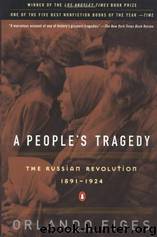A People's Tragedy by Orlando Figes

Author:Orlando Figes [Figes, Orlando]
Language: eng
Format: epub
Published: 2011-04-27T18:30:00+00:00
This at last was mutiny: having been denounced as a rebel, Kornilov chose to rebel.
Several senior generals declared their support for him. Now Kerensky had a real
'counter-revolution' to deal with. On 29 August he crowned himself the new Commander-in-Chief, with Alexeev as his Chief of Staff, despite the latter's low opinion of Kerensky ('a nicompoop, buffoon and charlatan').80 He cabled Krymov with orders to halt the advance of his troops, some of which
had already reached the southern suburbs of the capital. The Soviet Executive, which had been divided over whether to support the Revolutionary Dictator, swung around to his defence on news of Krymov's advance. It called on its supporters to arm themselves for a struggle against the 'counter-revolution' and transformed Smolny into a command centre directing operations. It was back to the atmosphere of the Tauride Palace during the February Days, when tired soldiers lay around the Soviet building waiting for the generals to attack.
A special Committee for Struggle Against the Counter-Revolution was set up by the Soviet, with three representatives from each of the Menshevik, SR and Bolshevik Parties, to mobilize forces for the defence of the capital. This marked the political rehabilitation of the Bolsheviks after the July Days — and several prominent Bolshevik leaders, including Trotsky, were released from prison shortly afterwards. The Committee for Struggle represented a united front of the whole Soviet movement. But it was effectively dependent on the military organization of the Bolsheviks, without which, in the words of Sukhanov, it 'could only have passed the time with appeals and idle speeches by orators who had lost their authority'. Only the Bolsheviks had the ability to mobilize and arm the mass of the workers and soldiers, and they now worked in close collaboration with their rivals in the Soviets. Throughout the northern industrial regions ad hoc revolutionary committees were formed in line with the Committee for Struggle. Some of them called themselves 'Committees of Public Safety' in emulation of the Jacobins. There was no real leadership of this spontaneous movement. Garrisons placed themselves on alert, and despatched detachments of soldiers to 'defend the revolution'. The Kronstadt sailors, who had last come to Petrograd during the July Days to overthrow the Provisional Government, arrived once again — this time to defend it.
The Red Guards and trade unions organized the defence of the factories. Vikzhel, the Railwaymen's Union, set up a bureau to combat Krymov's troops and managed to hold up their progress towards Petrograd by withholding engines and obstructing the line.81
Meanwhile, Krymov's troops were harangued by Soviet agitators. They had no desire to overthrow the Provisional Government — Kornilov had instructed them to defend it against the Bolsheviks — and once they were told that it was not in danger from the Left, they soon laid down their arms. Contrary to the Soviet myth, no actual fighting took place in the defeat of Kornilov. What would have been the point? Both sides had gone to defend the Provisional Government, and as soon as this was established they began to fraternize.
Download
This site does not store any files on its server. We only index and link to content provided by other sites. Please contact the content providers to delete copyright contents if any and email us, we'll remove relevant links or contents immediately.
| Africa | Americas |
| Arctic & Antarctica | Asia |
| Australia & Oceania | Europe |
| Middle East | Russia |
| United States | World |
| Ancient Civilizations | Military |
| Historical Study & Educational Resources |
Red Famine: Stalin's War on Ukraine by Anne Applebaum(2463)
Chernobyl by Serhii Plokhy(2128)
Midnight in Chernobyl by Adam Higginbotham(2078)
The House of Government by Slezkine Yuri(1844)
Midnight in Chernobyl: The Untold Story of the World's Greatest Nuclear Disaster by Adam Higginbotham(1775)
Red Shambhala by Andrei Znamenski(1747)
The Gulag Archipelago (Vintage Classics) by Aleksandr Solzhenitsyn(1725)
From Cold War to Hot Peace by Michael McFaul(1712)
All the Kremlin's Men by Mikhail Zygar(1695)
Putin's Labyrinth(1656)
The Future Is History by Masha Gessen(1591)
Red Notice by Bill Browder(1590)
From Russia with Lunch by David Smiedt(1551)
A People's Tragedy by Orlando Figes(1542)
The Romanovs by Simon Sebag Montefiore(1485)
How to Tame a Fox (and Build a Dog): Visionary Scientists and a Siberian Tale of Jump-Started Evolution by Lee Alan Dugatkin & Lyudmila Trut(1468)
Putin's Labyrinth: Spies, Murder, and the Dark Heart of the New Russia(1454)
The Lost Spy by Andrew Meier(1397)
Art and Revolution by John Berger(1386)
